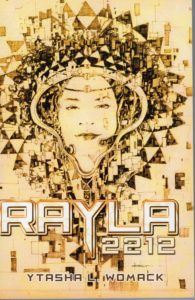Book Review: Rayla 2212 by Ytasha L. Womack
It is the year 2212, and the once utopian Planet Hope has fallen under the dictatorship of The Dirk. Rayla Illmatic, aka Rayla Redfeather, daughter of a missing astronaut, has joined the resistance. When rebel leader Carcine, who Rayla likes a lot, disappears on a mission to find mystic/scientist Moulan Shakur, she must take up the quest. It is Rayla’s destiny to find the missing astronauts scattered in Earth’s past, and restore the balance of her world. Or is it?
This is the first science fiction novel by Afrofuturist Ytasha Womack; it is set in a future where “race” as it is currently understood is no longer a relevant concept, but carrying forward the vitality of African-American culture and its African roots. This is more revolutionary than it should be, due to inertia making straight white middle-class American men the default protagonists of most SF. Notably, when the story goes back to 20th Century Earth, racism is mentioned but isn’t at all a focus in that section.
The primary “big idea” is that linear space-time is a social construct. Properly-trained people of sufficient mental strength can teleport to where/when they choose. However, Planet Hope’s society began to unravel when all the astronauts with this training failed to come back from a mission; Rayla’s father reappeared momentarily some time later, but just as quickly vanished again. Moulan, who came up with the training, enlists Rayla’s help in relocating the lost.
However, we learn that Moulan is keeping secrets from Rayla, as is Rayla’s new partner Delta Blue. Rayla’s memories have been tampered with more than once, and the people she meets warn her against each other while withholding information our heroine thinks might be important. She also notes that her “destiny” never seems to be anything she actually wants to do with her life.
I’m reminded of the New Wave speculative fiction of the 1970s, both because of the multiple layers of deception and fluid nature of reality (is Rayla participating in the past or is she shaping it?), and in the “experimental” feel of the writing. There are quotes, most relevant, interrupting the narrative from time to time, as well as soundtrack recommendations–this tapers off as the book progresses. Despite the non-linear nature of space-time in the story, the narrative itself is mostly linear with some flashbacks.
This edition of the book was self-published, and there are multiple spellchecker typos and misplaced quotation marks. I also found the ending rather muddled and arbitrary; perhaps this is to allow for the sequel, conveniently titled Rayla 2213. There’s some on-page non-explicit sex.
This book would be of most interest to readers wanting to sample Afrofuturism, or looking for a protagonist who’s not the standard SF model.

